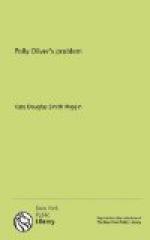CHAPTER
I. A DECLARATION OF
INDEPENDENCE
II. FORECASTING THE
FUTURE
III. THE DOCTOR GIVES POLLY
A PRESCRIPTION
IV. THE BOARDERS STAY,
AND THE OLIVERS GO
V. TOLD IN LETTERS
VI. POLLY TRIES A LITTLE
MISSIONARY WORK
VII. “WHERE IGNORANCE
IS BLISS”
VIII. TWO FIRESIDE CHATS
IX. HARD TIMES
X. EDGAR GOES TO CONFESSION
XI. THE LADY IN BLACK
XII. THE GREAT SILENCE
XIII. A GARDEN FLOWER, OR A BANIAN-TREE
XIV. EDGAR DISCOURSES OF SCARLET
RUNNERS
XV. LIFE IN THE BIRDS’
NEST
XVI. THE CANDLE CALLED PATIENCE
XVII. POLLY LAUNCHES HER SHIPS
XVIII. THE CHILDREN’S HOUR:
REPORTED IN A
LETTER
BY AN EYE-WITNESS
ILLUSTRATIONS
PORTRAIT OF MRS. WIGGIN . . . . . . . . . Frontispiece
MRS. OLIVER AND POLLY
“IT IS SOME OF THE STUDENTS”
“SHE OPENED THE BOOK AND READ”
[Transcriber’s note: The second illustration was missing from the original book.]
POLLY OLIVER’S PROBLEM.
“Pretty Polly Oliver, my hope and
my fear,
Pretty Polly Oliver, I’ve
loved you so dear!”
DINAH
MARIA MULOCK.
CHAPTER I.
A DECLARATION OF INDEPENDENCE.
“I have determined only one thing definitely,” said Polly Oliver; “and that is, the boarders must go. Oh, how charming that sounds! I ’ve been thinking it ever since I was old enough to think, but I never cast it in such an attractive, decisive form before. ’The Boarders Must Go!’ To a California girl it is every bit as inspiring as ’The Chinese Must Go.’ If I were n’t obliged to set the boarders’ table, I ’d work the motto on a banner this very minute, and march up and down the plaza with it, followed by a crowd of small boys with toy drums.”
“The Chinese never did go,” said Mrs. Oliver suggestively, from the sofa.
“Oh, that’s a trifle; they had a treaty or something, and besides, there are so many of them, and they have such an object in staying.”
“You can’t turn people out of the house on a moment’s warning.”
“Certainly not. Give them twenty-four hours, if necessary. We can choose among several methods of getting rid of them. I can put up a placard with
BOARDERS, HO!
printed on it in large letters, and then assemble them in the banquet-hall and make them a speech.”
“You would insult them,” objected Mrs. Oliver feebly, “and they are perfectly innocent.”
“Insult them? Oh, mamma, how unworthy of you! I shall speak to them firmly but very gently. ‘Ladies and gentlemen,’ I shall begin, ’you have done your best to make palatable the class of human beings to which you belong, but you have utterly failed, and you must go! Board, if you must, ladies and gentlemen, but not here! Sap, if you must, the foundations of somebody else’s private paradise, but not ours. In the words of the Poe-et, “Take thy beaks from off our door."’ Then it will be over, and they will go out.”




